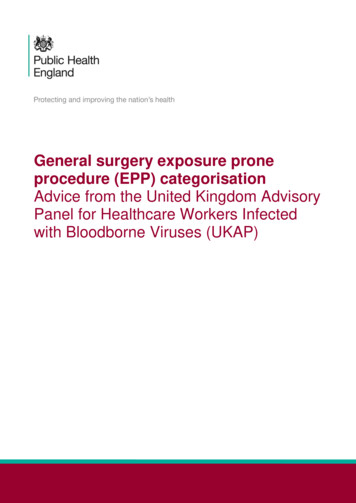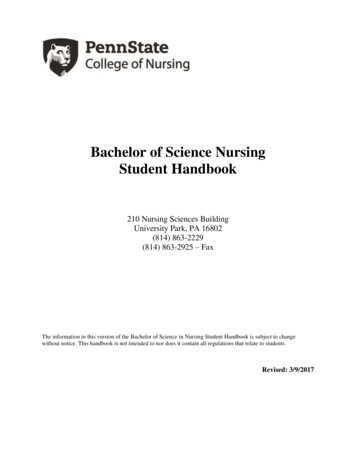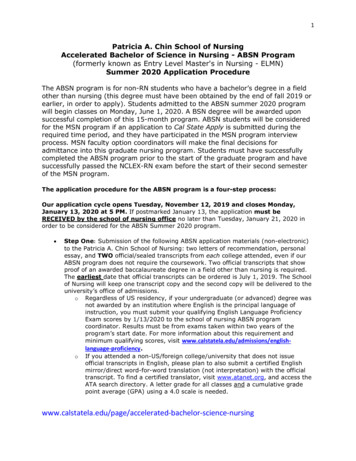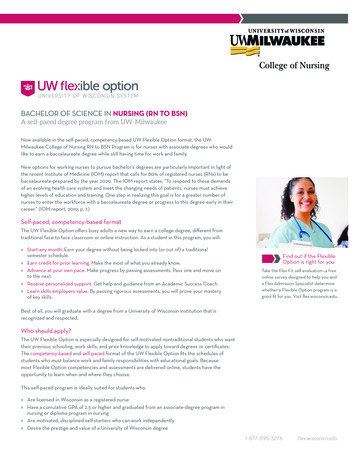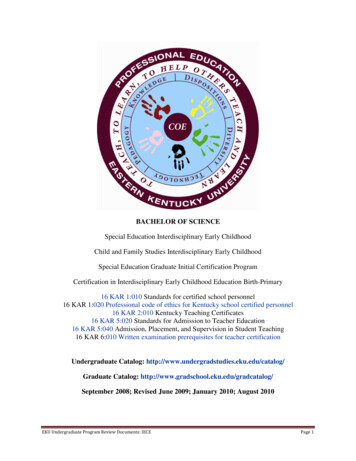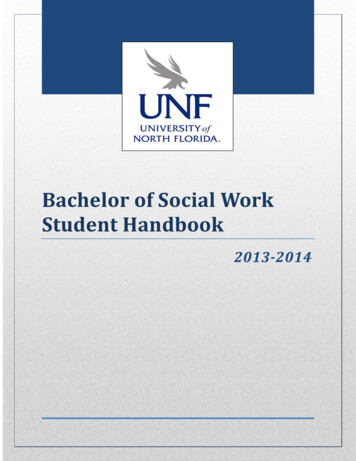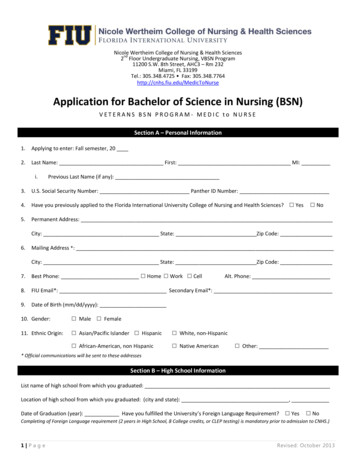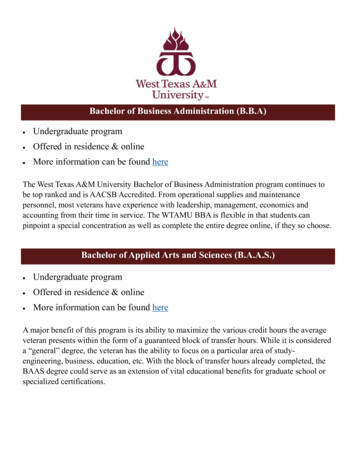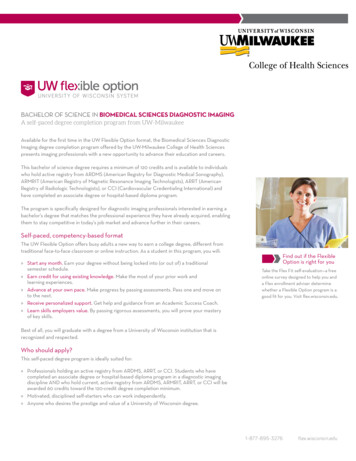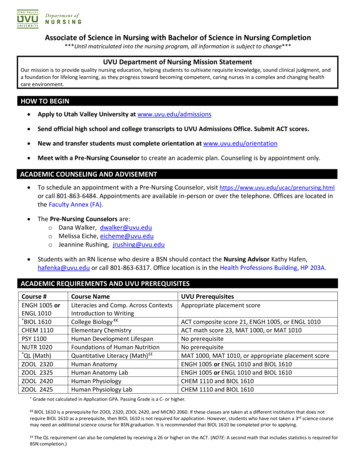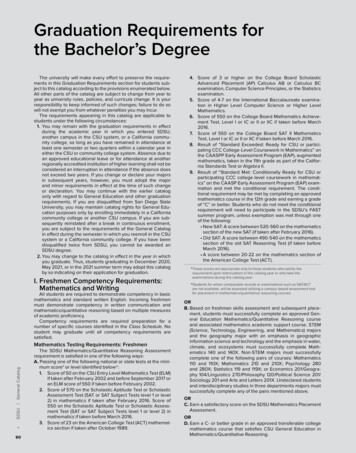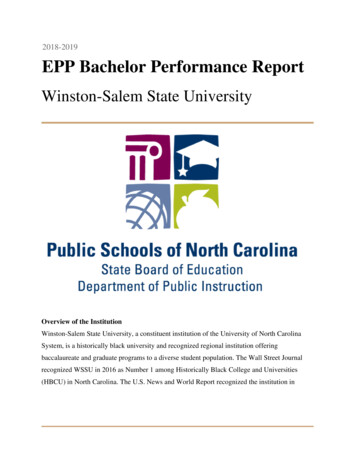
Transcription
2018-2019EPP Bachelor Performance ReportWinston-Salem State UniversityOverview of the InstitutionWinston-Salem State University, a constituent institution of the University of North CarolinaSystem, is a historically black university and recognized regional institution offeringbaccalaureate and graduate programs to a diverse student population. The Wall Street Journalrecognized WSSU in 2016 as Number 1 among Historically Black College and Universities(HBCU) in North Carolina. The U.S. News and World Report recognized the institution in
2016, 2017, and 2018 as one of the Top Historically Black Colleges and Universities, andDiverse Issues in Higher Education ranked WSSU in 2017 as Number 1 in North Carolina forgraduating Black students in the field of education.Winston-Salem State University was founded in 1892 as Slater Industrial Academy by SimonGreen Atkins and was chartered in 1899 as the Slater Industrial and State Normal School. In1925, the General Assembly of North Carolina recognized the school’s curriculum above highschool and changed the name of the institution to Winston-Salem Teachers College. The collegewas empowered it under authority of the State Board of Education to confer appropriate degrees.Thus, Winston-Salem Teachers College became the first black institution in the United States togrant degrees for teaching elementary grades. In response to a growing medical communityemerging in the Winston-Salem area, the School of Nursing was established in 1953, awardinggraduates the degree of Bachelor of Science. In recognition of the university’s growingcurriculum and expanding role, the North Carolina General Assembly of 1963 authorizedchanging the name from Winston-Salem Teachers College to Winston-Salem State College. Thestate legislature authorized the renaming of the institution as Winston-Salem State University in1969, and in 1972, Winston-Salem State University became one of the 16 constituent institutionsof the University of North Carolina, subject to the control of a Board of Governors.Winston-Salem State University continues its ongoing commitment to academic excellence andequity through its focus on providing a comprehensive liberal arts education, on building uponthe success of its graduate and professional programs, and by rooting its strategic plan in theprinciple of equity. The University recognizes the impact of cumulative disadvantages ofhistorical race and class inequities that limit the ability of its students, who are disproportionatelyminority and low income, to engage and persist in their education. Thus, the University embracesequity beliefs and practices that support success for its population of students. The Universitystrives to develop graduates who thrive in a dynamic and global society and become leaders whoadvance social justice by serving the world with compassion and commitment. The Universitymission states:2
“Winston-Salem State University is a comprehensive, historically Black universityoffering innovative undergraduate programs and exceptional graduate programs groundedin the tradition of liberal education. Students engage in active and experiential learningoffered through flexible delivery modes. The university is dedicated to the holisticdevelopment of students by faculty dedicated to excellence in teaching, research, andservice. As a constituent institution of the University of North Carolina, Winston-SalemState University contributes to the social, cultural, intellectual and economic growth ofNorth Carolina, the region, and beyond.”The 2016-2021 University Strategic Plan advances the mission of the university through focuson the five goals of 1) strengthening liberal education, 2) enhancing the quality of graduate andprofessional programs, 3) building commitment to social justice through enhanced communityengagement, 4) enhancing revenue and stewardship of resources, and 5) enhancing the quality ofphysical and operational infrastructure.The academic programs, which are aligned to the University mission and supported by thestrategic plan, are situated within two academic units, The College of Arts, Sciences, Businessand Education (The College), and the School of Health Sciences. The University College andLifelong Learning academic unit provides oversight of the liberal education grounded generaleducation curriculum and supplies academic support for freshman and other students at the preprogram admission level. The College encompasses the largest segment of academic programs atthe University and provides the broad liberal arts foundation that underpins the academic andprofessional development of students and as well offers the professional programs in businessand education.The programs of The College are contained within departments residing within five faculties, 1)the Faculty of Arts and Humanities, 2) the Faculty of Business, 3) the Faculty of Education, 4)the Faculty of Natural and Physical Sciences, and 5) the Faculty of Social Science. The programsof the School of Health Sciences, which educate diverse health professionals, are containedwithin seven departments. The University’s programs include 39 bachelor’s degree programs, 73
master’s degree programs, 2 doctoral degree programs, and 1 post – master’s certificate program.In Fall 2018, WSSU enrolled 5190 students of whom 91.3% were undergraduate students and8.7% graduate students. Full-time students accounted for 85% of enrollment and part-timestudents were 15% of enrollment. Females were 72.5% of enrolled students and males were21.5%. Reported ethnicities of enrolled students were 73.9% African American, 14.6% White,8.7% under-represented minorities, 1.1% Asian, and 1.8% ethnicity unknown.Special CharacteristicsThe programs offered at Winston – Salem State University are grounded in a liberal artseducation foundation intended to provide students with a comprehensive array of essentialintellectual and leadership skills needed for success in the 21st century global community.Students completing studies at Winston-Salem State University are required to take a minimumof sixty (60) hours of General Education courses outside of their major field of study. In thegeneral education, students complete coursework that address seven areas of knowledge, sevenlearning outcomes, and six curricular themes. The areas of knowledge include literature,historical studies, social/behavioral sciences, natural sciences, mathematics and quantitativelogic, fine arts, and foreign language and culture. The seven student learning outcomes arecritical thinking, critical reading, written communication, oral communication, scientific literacy,quantitative literacy, and information literacy. The curricular themes encompass globalization,diversity, sustainability, civic engagement, moral and ethical reasoning, and healthy living.Students also participate in liberal learning seminars that place strong emphasis on criticalinquiry, reading, writing and collaborative learning.Underpinning student success in the general education curriculum are the components of thegeneral education advisement provided by general education faculty from all academic programsand the services available in the Student Success Center (SSC). General education advisors guidestudents in selecting general education courses that address the areas of knowledge, learningoutcomes, and curricular themes while also meeting pre-requisite requirements for entry intotheir major programs. General education advisors also assist students in identifyingdevelopmental needs through the EAB Navigate Campus Support System and refer them to4
additional academic advising and support available through the SSC. Services provided in the“one stop shop” environment of SSC include writing and quantitative skills centers, tutoringservices, technological support, and the offices of career development and internationalprograms.Program Areas and Levels OfferedAdministrative oversight of the Educator Preparation Program resides within the Faculty ofEducation and is the responsibility of the Chair of the Department of Education with oversight bythe Dean of the College of Arts, Sciences, Business and Education. Educator preparationprograms are hosted within the Faculty of Education, the Faculty of Arts and Humanities and theFaculty of Natural and Physical Sciences. Within the Faculty of Education, programs in theDepartment of Education include the B.S. in Birth through Kindergarten Education withconcentrations in Birth-Kindergarten Licensure, Administration and Leadership, and EarlyIntervention and Preschool; the B.S. in Elementary Education; the B.S. in Teaching with teacherlicensure concentrations in Secondary English Education, Secondary Mathematics Education,Middle Grades Education, and Special Education; the Master of Arts in Teaching withconcentrations in Middle Grades Education and Special Education, and the P.B. certificate inAdd-on Licensure in English as a Second Language.Faculty in the Department of English in the Faculty of Arts and Humanities, and faculty in theDepartment of Mathematics in the Faculty of Natural and Physical Sciences liaise with faculty inthe Department of Education to offer the B.S. in Teaching concentrations in Secondary Englishand Secondary Mathematics Education. The B.S. in Teaching concentration in Middle GradesEducation includes licensure options in Language Arts, Mathematics, Science, and SocialStudies. The Master of Arts in Teaching (MAT) includes Middle Grades licensure options inLanguage Arts, Mathematics, and Science. The Department of Health, Physical Education andSports Studies in the Faculty of Education hosts the Bachelor of Science in Physical Educationwith Teacher Licensure. The Department of Fine Arts within the Faculty of Arts and Humanitieshosts the Bachelor of Arts in Music with concentration in Music Education Licensure.5
In addition to the degree program offerings, the Educator Preparation Program also servesindividuals possessing a bachelor’s degree who wish to complete coursework and clinicalinternships to qualify for initial licensure. Individuals possessing a bachelor’s degree, who do notwish to enroll in the MAT, may complete licensure requirements in the undergraduate licensureonly option by completing the undergraduate coursework and experiences required for licensure.All educator preparation programs are coordinated by the Professional Education Committee(PEC). The PEC is the advisory and governance structure for development and implementationof policies and procedures that impact P-12 teacher education preparation. The EducatorPreparation Program holds National Council for Accreditation of Teacher Education (NCATE)accreditation which is administrated by the Council for Accreditation of Educator Preparation(CAEP) through the end of the accreditation cycle in 2022. All educator preparation programsare approved by the North Carolina State Board of Education.Pathways Offered (Place an ‘X’ under each of the options listed below that your IHEProvides)TraditionalLateral EntryResidencyXBrief description of unit/institutional efforts to promote SBE priorities.For the 2018-19 report, briefly describe your current efforts or future plans to respond to therecent legislative provisions below.Share the extent to which your EPP prepares educators, including general educationteachers and special education teachers, to effectively teach students with disabilities.Prospective general education and special education teachers in both the undergraduate andgraduate level programs take courses that provide instruction on strategies to effectively teachstudents with disabilities. Additionally, candidates in the senior year Pre-clinical Internship, the6
Student Teaching, and the Master of Arts in Teaching internship are encouraged to attend IEPmeetings in their school placements, if allowed to participate by school personnel and ifpermitted by parents. Candidates participating in the IEP meetings have authentic experiences inthe conduct of IEP meetings.Both prospective general and special education teachers in undergraduate programs take thecourse SPE 3300 Exceptional Children in the Regular Classroom where they learn the requiredskills to teach children and youth with disabilities who are integrated into the regular classroom.This course explores techniques designed to aid prospective general education and specialeducation teachers in working with children with disabilities included in regular schools andclassrooms at the elementary and secondary levels. The course covers a range of topics,including issues in special education, inclusion, educational assessment, characteristics ofmainstreamed students, cultural diversity, and curricula modifications and adaptations. The SPE3300 course also includes focused attention on co-teaching and other best practices for teachingin inclusion settings. This instruction provides prospective general education classroom teacherswith the skills to work side-by-side with special education teachers who are responsible formeeting the requirements of IDEA.Undergraduate pre-service teachers in Physical Education take the course PED 4320 AdaptedPhysical Education for Exceptional Children. This course examines the nature of disablingconditions and the use of motor skills to enable adaptation to social life, community living, andrecreational environments. The role of the adaptive physical education program in the regularphysical education program is also covered in this course. Undergraduate pre-service teachers inMusic Education take Music for Exceptional Children, which addresses techniques andexperiences for teaching music to children with exceptionalities. Exceptionalities covered in thiscourse include academically gifted, physical disabilities, cognitive disorders, behavioraldisorders, and English Language learners. Topics in the course address and examine legislation,school policies including Individualized Education Plans, and instructional strategies in music.7
Undergraduate pre-service teachers in Birth-Kindergarten, Elementary, and Special Educationare also required to take the course EDU/SPE 3322 Parent, School, and Community Relations.This course is devoted to the study of the major principles upon which effective home-schoolcommunity relations are based. It also emphasizes the ways in which parents/families andteachers may make effective use of community agencies and resources whose services andactivities may benefit children's development and well-being. Another emphasis of the course isthe techniques used in parental/family interviews, conferences and referrals by school personnelwith parents of children with and without disabilities, and strategies practiced by agencies thatwork with families. Further emphasis is placed on promoting social justice and working withculturally and linguistically diverse students and their families.Three courses in the Master of Arts in Teaching are specifically designed to prepare generaleducation teacher candidates to participate as members of individualized learning planning teamsas well as to teach students with disabilities and limited English proficient students. In EDU5340 Teaching in Diverse Classrooms, candidates learn to create inviting, respectful, supportive,and inclusive classrooms and to create lessons that counteract stereotypes and incorporatehistories and contributions of the various cultures of their students. Candidates also learn toidentify the range of support specialists available to help meet the special needs of all studentsand to plan collaboratively with them for the benefit of students with special needs. In addition,candidates learn how to select appropriate and effective strategies in meeting the needs of allstudents. The course SPE 6304 Building Collaborative Family, School, and CommunityRelationships emphasizes the ways in which parents and teachers may make effective use ofcommunity agencies whose activities may have a beneficial effect upon the development ofchildren. The course also emphasizes techniques used in parental interviews, conferences andreferrals by school personnel with parents of children with and without disabilities, and strategiespracticed by agencies that work with families. The course also includes instruction on workingwith culturally and linguistically diverse students and their families. The SPE 5315 Diagnosisand Remediation of Reading Difficulties for Exceptional Students course provides in-depth studyof the causes of reading difficulties and instruction on the selection, creation and use of formaland informal instruments for diagnosis of reading difficulties. Candidates practice using8
diagnostic tools commonly used by schools and learn how to evaluate, select, and useappropriate equipment, materials, and methods of remediation of reading difficulties.Prospective undergraduate special education teachers take additional special education courses,beyond those described above, to expose them to a variety of theories and practices forsupporting learning for students with special needs who are integrated into the regular classroom.Theory courses are designed to provide future teachers with the background necessary to bothunderstand the complexity of special education as well as having the specific knowledge neededto be an effective professional. Courses that focus on practice expose teacher candidates to bestpractices in the field as well. Through this coursework and diverse field placements, WSSU’scandidates have an opportunity to learn, practice, and refine their ability to teach a range of P-12students.Specific coursework and assignments for undergraduate Special Education candidates includethe following:(1) SPE 3330 Exceptional Children in the Regular Classroom: This course explorestechniques designed to aid prospective regular and special education teachers in workingwith children with disabilities who are included in regular schools and classrooms at theelementary and secondary levels. The course covers a range of topics, including issues inspecial education, inclusion, educational assessment, characteristics of mainstreamedstudents, cultural diversity and curricula modifications and adaptations. The course alsoincludes co-teaching and working side-by-side with teachers in the regular classroom tomeet the requirements of IDEA. Students complete a resource file on working withchildren with disabilities, which includes one section on working with culturally andlinguistically diverse students.(2) SPE 3320 Characteristics of Students with Learning Disabilities: Teacher educationcandidates develop a mock Individualized Education Plan (IEP) based on the informationthey receive about students when completing their field experience. All teacher educationcandidates completing this course are required to become familiar with a student with alearning disability and complete an Individualized Education Plan (IEP)/Curriculum-9
Based Measurement (CBM) Case Report. Candidates' conduct of the IEP/CBM CaseReport includes selection of a student with mild disabilities, interacting with the student,reviewing the cumulative folder, observing the student, getting feedback from teachers,other professionals and parents, and administering an assessment tool. After evaluatingfindings, candidates should have enough information to help a teacher with anexceptional child in the classroom prepare for an IEP meeting. Candidates are responsiblefor providing input and documenting the areas of the IEP DEC 4 form.(3) SPE 3325 Methods of Enhancing Reading Skills for Students with Exceptional Needs:Undergraduate teacher education candidates research findings on teaching reading tostudents with special needs. Students in the course research reading development, readingdifficulties, and principles of effective reading instruction. Both formal and informalinstruments for diagnosis of reading difficulties are analyzed, evaluated, andadmin
master’s degree programs, 2 doctoral degree programs, and 1 post – master’s certificate program. In Fall 2018, WSSU enrolled 5190 students of whom 91.3% were undergraduate students and 8.7% graduate students. Full-time students accounted f
